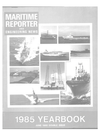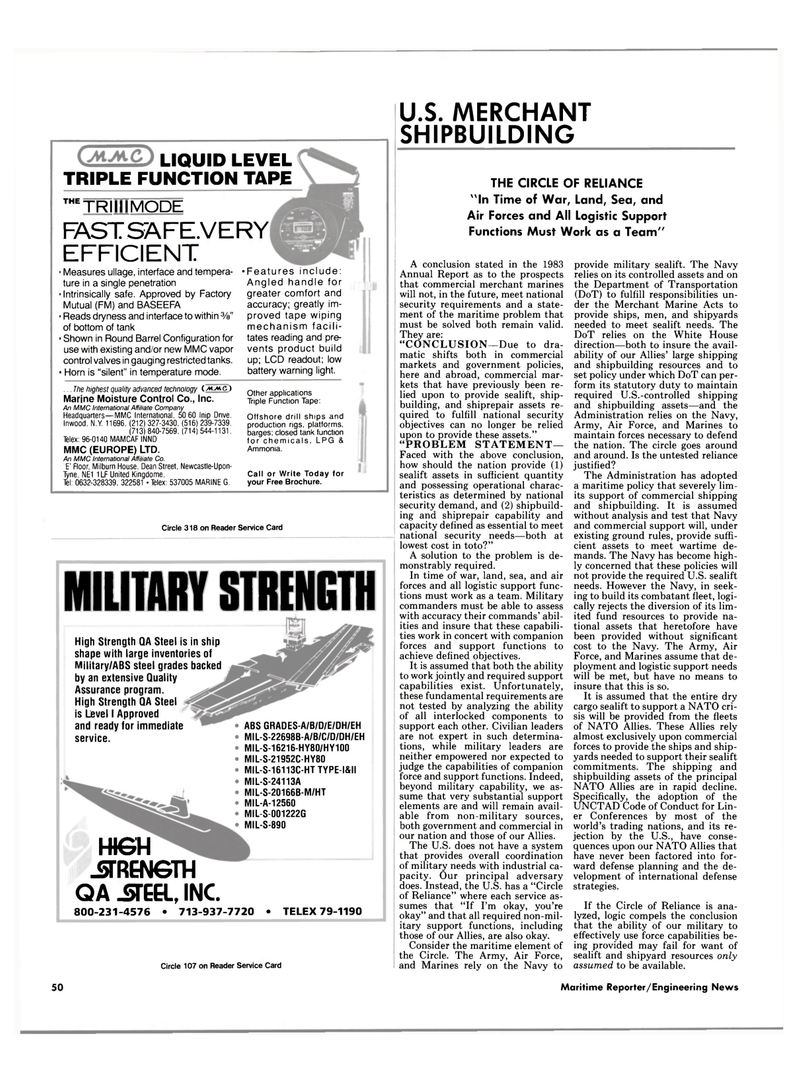
Page 52: of Maritime Reporter Magazine (June 1985)
Read this page in Pdf, Flash or Html5 edition of June 1985 Maritime Reporter Magazine
LIQUID LEVEL
TRIPLE FUNCTION TAPE
THE TRiniMODE
FASTSAFE.VERY
EFFICIENT • Measures ullage, interface and tempera- ture in a single penetration • Intrinsically safe. Approved by Factory
Mutual (FM) and BASEEFA • Reads dryness and interface to within %" of bottom of tank > Shown in Round Barrel Configuration for use with existing and/or new MMC vapor control valves in gauging restricted tanks. • Horn is "silent" in temperature mode. •Features include:
Angled handle for greater comfort and accuracy; greatly im- proved tape wiping mechanism facili- tates reading and pre- vents product build up; LCD readout; low battery warning light. ...The highest quality advanced technology (MSAC)
Marine Moisture Control Co., Inc.
An MMC International Affiliate Company
Headquarters—MMC International. 50 60 Inip Drive.
Inwood, N.Y. 11696, (212) 327-3430. (516) 239-7339, (713) 840-7569, (714)544-1131,
Telex: 96-0140 MAMCAF INND
MMC (EUROPE) LTD.
An MMC International Affiliate Co.
E' Floor, Milburn House. Dean Street. Newcastle-Upon-
Tyne, NE1 1LF United Kingdome,
Tel: 0632-328339. 322581 • Telex: 537005 MARINE G.
Other applications
Triple Function Tape:
Offshore drill ships and production rigs, platforms, barges: closed tank function for chemicals, LPG &
Ammonia.
Call or Write Today for your Free Brochure.
Circle 318 on Reader Service Card
MILITARY STRENGTH
High Strength QA Steel is in ship shape with large inventories of
Military/ABS steel grades backed by an extensive Quality
Assurance program.
High Strength QA Steel is Level I Approved and ready for immediate service.
ABS GRADES-A/B/D/E/DH/EH
MIL-S-22698B-A/B/C/D/DH/EH
MIL-S-16216-HY80/HY100
MIL-S-21952C-HY80
MIL-S-16113C-HT TYPE-I&II
MIL-S-24113A
MIL-S-20166B-M/HT
MIL-A-12560
MIL-S-001222G
MIL-S-890 l-HGH .STRENGTH
OA .STEEL, INC. 800-231-4576 • 713-937-7720 • TELEX 79-1190
U.S. MERCHANT SHIPBUILDING
THE CIRCLE OF RELIANCE "In Time of War, Land, Sea, and
Air Forces and All Logistic Support
Functions Must Work as a Team"
Circle 107 on Reader Service Card
A conclusion stated in the 1983
Annual Report as to the prospects that commercial merchant marines will not, in the future, meet national security requirements and a state- ment of the maritime problem that must be solved both remain valid.
They are: "CONCLUSION—Due to dra- matic shifts both in commercial markets and government policies, here and abroad, commercial mar- kets that have previously been re- lied upon to provide sealift, ship- building, and shiprepair assets re- quired to fulfill national security objectives can no longer be relied upon to provide these assets." "PROBLEM STATEMENT—
Faced with the above conclusion, how should the nation provide (1) sealift assets in sufficient quantity and possessing operational charac- teristics as determined by national security demand, and (2) shipbuild- ing and shiprepair capability and capacity defined as essential to meet national security needs—both at lowest cost in toto?"
A solution to the problem is de- monstrably required.
In time of war, land, sea, and air forces and all logistic support func- tions must work as a team. Military commanders must be able to assess with accuracy their commands' abil- ities and insure that these capabili- ties work in concert with companion forces and support functions to achieve defined objectives.
It is assumed that both the ability to work jointly and required support capabilities exist. Unfortunately, these fundamental requirements are not tested by analyzing the ability of all interlocked components to support each other. Civilian leaders are not expert in such determina- tions, while military leaders are neither empowered nor expected to judge the capabilities of companion force and support functions. Indeed, beyond military capability, we as- sume that very substantial support elements are and will remain avail- able from non-military sources, both government and commercial in our nation and those of our Allies.
The U.S. does not have a system that provides overall coordination of military needs with industrial ca- pacity. Our principal adversary does. Instead, the U.S. has a "Circle of Reliance" where each service as- sumes that "If I'm okay, you're okay" and that all required non-mil- itary support functions, including those of our Allies, are also okay.
Consider the maritime element of the Circle. The Army, Air Force, and Marines rely on the Navy to provide military sealift. The Navy relies on its controlled assets and on the Department of Transportation (DoT) to fulfill responsibilities un- der the Merchant Marine Acts to provide ships, men, and shipyards needed to meet sealift needs. The
DoT relies on the White House direction—both to insure the avail- ability of our Allies' large shipping and shipbuilding resources and to set policy under which DoT can per- form its statutory duty to maintain required U.S.-controlled shipping and shipbuilding assets—and the
Administration relies on the Navy,
Army, Air Force, and Marines to maintain forces necessary to defend the nation. The circle goes around and around. Is the untested reliance justified?
The Administration has adopted a maritime policy that severely lim- its support of commercial shipping and shipbuilding. It is assumed without analysis and test that Navy and commercial support will, under existing ground rules, provide suffi- cient assets to meet wartime de- mands. The Navy has become high- ly concerned that these policies will not provide the required U.S. sealift needs. However the Navy, in seek- ing to build its combatant fleet, logi- cally rejects the diversion of its lim- ited fund resources to provide na- tional assets that heretofore have been provided without significant cost to the Navy. The Army, Air
Force, and Marines assume that de- ployment and logistic support needs will be met, but have no means to insure that this is so.
It is assumed that the entire dry cargo sealift to support a NATO cri- sis will be provided from the fleets of NATO Allies. These Allies rely almost exclusively upon commercial forces to provide the ships and ship- yards needed to support their sealift commitments. The shipping and shipbuilding assets of the principal
NATO Allies are in rapid decline.
Specifically, the adoption of the
UNCTAD Code of Conduct for Lin- er Conferences by most of the world's trading nations, and its re- jection by the U.S., have conse- quences upon our NATO Allies that have never been factored into for- ward defense planning and the de- velopment of international defense strategies.
If the Circle of Reliance is ana- lyzed, logic compels the conclusion that the ability of our military to effectively use force capabilities be- ing provided may fail for want of sealift and shipyard resources only assumed to be available. 50 Maritime Reporter/Engineering News

 51
51

 53
53
